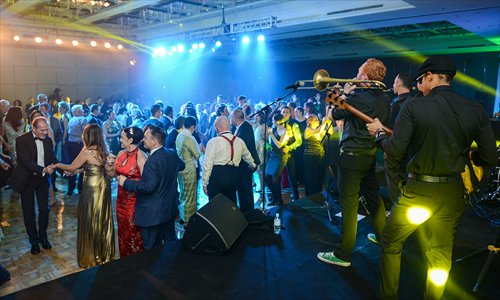A look at the growing tide of foreign musicians flowing into China’s capital

Tash, vocalist of Beijing-based band The Groove Collective, which was founded by Neil Larocque Photo: Courtesy of Neil Larocque
By the time 38-year-old Neil Larocque moved to Beijing in 2012, he had decided he was done with music. After more than 20 years of playing guitar in bands, mostly in his native Canada, he was burned out - weary of the musician's life and discouraged by the lack of success or interest in his music.
Part of what made the decision was the six years he spent in Tokyo before moving to Beijing, throughout which he played gigs and released two albums.
"Playing in Japan is not nearly as enjoyable or easy as playing in China. It's a different system," said Larocque. There, livehouses require that you pay to play, and that you pull a certain number of audience members into your gigs." Also, his CDs did not sell well. "I still have about 500 CDs in Tokyo somewhere," he said. "Maybe I'll give them away on Taobao."
In Beijing, though, he found things to be different. Despite his initial vow, after observing the vibrancy of Beijing's music scene, Larocque and his friend Rich decided to form their own band called The Groove Collective, an international funk quartet that quickly won a regular fanbase. Though Larocque recently moved to Shenzhen, Guangdong Province and currently isn't active in music, the band has continued on without him.
The same things that reinvigorated Larocque's love for music have attracted a number of other foreign musicians to Beijing, or else awakened the impulse in expats who otherwise might let their creative tendencies lie latent. So what is it that's so special about Beijing? Philippe Bouvet, 52, a French music producer who's been creating music for more than 20 years and opened a venue in Beijing in 2007, has the answer.
"No other Chinese cities are so into culture, either [back in 2007] or even now," Bouvet said. "In terms of a place for music, there is no other choice."

Tavey Lean and the Solid Gold Dream Machine perform at an Irish ball. It is among the bands that Rich, the guitar player for The Groove Collective, plays in. Photo: Courtesy of Rich
Beijing's tight community
Among the biggest reasons that so many foreign bands are thriving in Beijing is the city's supportive atmosphere and the close relationship between musicians and the audience, said Larocque, who recalls a number of past gigs filled with enthusiastic spectators, some of whom even jumped on stage with them.
"I'd say my favorite surprise was when we were playing at the old MAKO Live House in Shuangjing to about 2,000 people and some random guy jumped on stage, grabbed the microphone and starting busting hip-hop rhymes in Chinese and English," said Larocque. "We just laid down an impromptu groove in the background."
Lukas Thibaut, a 29-year-old communications manager from the UK, agrees that the supportive tenor of Beijing's music scene is among its biggest perks. It's given him enough encouragement to dedicate himself full-force to his band, Jump the Fence, which he started in early 2015, serving as drummer, with a US singer and a Chinese bassist. Their reception thus far has been a far cry from his experience playing in bands back in the UK.
"In general, if you're not known in the UK, venues and audience members will expect you to fail and you need to prove yourself to them," said Thibaut. "There's a lot of pressure and people are more judgmental, so it's difficult to catch a break, but in Beijing, it's the complete opposite."
On April 16, his band played a gig at local venue Temple and it was, he says, a veritable comedy of errors. It started out with their guitarist snapping a string, followed by the bassist's strap breaking. Meanwhile, their singer's microphone cable became tangled in the mic stand, and Thibaut, in a panic, accidentally knocked a drum-mic out of place. But despite this string of technical difficulties, they just kept going and the crowd loved it.
"It was almost comical and we were all laughing with the audience and dancing at the same time; it was a great night and we won't forget that so easily," said Thibaut. "If that same situation had happened in London, I'm pretty sure we would have been laughed at and booed off the stage. What makes Beijing such a great place to play music is that fans and audience members are always very supportive, enthusiastic and open-minded. They give us their full energy and attention, and we give it back to them twice as hard."

Lukas Thibaut (left) and Jody Wade, the singer and keyboard player of Jump the Fence, perform at Yugong Yishan, a local music venue in Beijing. Photo: Courtesy of Yang Xiaojun
Enjoying a supportive venue culture
Another thing that Thibaut said Beijing has to offer is a level of convenience and ease that trumps any of the venues he's performed at in London.
"You need to bring ALL your own equipment, and imagine bringing a full drum kit, bass amp, guitar amp and PA system (public address system) to a venue during the evening rush-hour on the London underground," said Thibaut. "And if you're lucky enough to have access to a car, good luck finding a parking space anywhere close to the venue. You will probably end up with a parking ticket for twice the fee that you get paid for the gig."
Here in Beijing, though, Thibaut said that most venues come with all the equipment a band needs, which means that they just need to bring their instruments and themselves.
Larocque shares Thibaut's opinion, saying that, in his experience, most club owners in Beijing are good to the bands. "They know how to deal with bands, which shows a level of professionalism that is much appreciated by musicians," said Larocque. "It's rare when we show up to a club which has nothing on stage in the way of electrical or musical equipment."
Larocque added they've always been paid properly, in addition to receiving free meals and drinks. "It's a nightmare to have to worry about a billion things and still play a good gig," he said. "For me, I only want to focus on playing and I expect that everything is in place when I arrive, and Beijing is very good for this."

Shi Shengchao, the bassist for Jump the Fence (left), and Lukas Thibaut during a live show at Yugong Yishan Photo: Courtesy of Yang Xiaojun
International melting pot
Despite its staggering size, Beijing boasts a small, tight-knit community of musicians, which means that no matter where new artists come from, they are welcomed with support and friendship from both expats and locals.
"We all know each other and support each other's projects, and that's why I think a lot of musicians are attracted to Beijing and decide to stay here," said Thibaut. "In my case, I didn't come to Beijing for the music, but it's definitely become the biggest reason keeping me here. It's very exciting and a very unique opportunity for us all in Jump the Fence to help shape the local music scene, and in doing so to become part of the city's endlessly diverse cultural scene."
According to Daniel Toto, 25, a full-time student from the US studying Chinese at Beijing Normal University, it also helps that there's so much creativity crammed into one place.
"You have the biggest mix of expats here with cultured Chinese so inevitably you will have the highest degree of refined culture and creativity in such a place," said Toto, who plays in a 1970s funk and disco band called Image Above All. He's also found a specific advantage to being a foreigner: "There isn't much competition to deal with in Beijing because Western bands are almost always taken more seriously and simply given a chance to play because we have white faces."
But there's a downside to playing in bands as an expat with expats - the fact that they're hard to keep going.
"Expats, by the nature of their definition, have a tendency to come and go. Most expats will only stay in Beijing for a year or two before leaving again, which makes it difficult to pursue long-term ambitions," said Thibaut. "So after a number of my projects 'failed' for that reason, I was determined to found a band with local Beijing musicians so that we could develop, record songs, build up a fanbase and hopefully leave our own mark on the local and maybe even national music scene."
While that may sound ambitious, Toto said it remains more of a possibility in China than in countries like the US or the UK, where the music markets are largely saturated. In Beijing, though, there's still space for creativity and trying new things.
"Beijing is the best city in China for music. The bar is always getting higher and we have to keep up with that as a foreign band, which makes us better in the end," said Toto. "The ones that can't keep up die off and so the bar just keeps getting higher here, whereas in other Chinese cities the bar simply doesn't exist."
But of course, local success is no guarantee of longevity - sometimes life gets in the way. Larocque for example, no longer plays music since moving to Shenzhen with his wife, and says he misses his life as a musician in Beijing very much.
"Without being melodramatic about it, playing music has been my life's blood since I was 12 years old," he said. "The friendships I made in Beijing, the feedback I get from audience members and the process of rehearsing or writing with band members can be addictive."
He said two of his band's members, Tash and Rich, even came to his wedding in Luoyang, Henan Province days before this year's Spring Festival. "We played a few songs at the ceremony, and when we were finished, Rich said, 'Some things will never change,' meaning that the musical connection between us will never go away."
Newspaper headline: Rock ‘n’ roll laowai